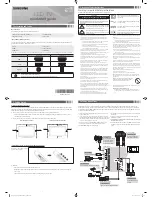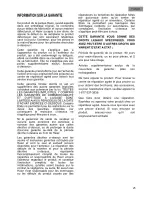
2
Setting up
2.1
TV stand and wall mounting
TV Stand
You can find the mounting instructions of the TV stand in the
Quick Start Guide that came with the TV. In case you lost this
guide, you can download it from
www.philips.com
.
Use the product type number of the TV to look for the Quick
Start Guide to download.
Wall mounting
Your TV is also prepared for a VESA-compliant wall mount
bracket (sold separately).
Use the following VESA code when purchasing the wall mount
. . .
VESA MIS-F 400x400,M6
To fix the bracket securely, use a screw length as shown in the
drawing.
Caution
Wall mounting the TV requires special skills and should only
be performed by qualified personnel. The TV wall mounting
should meet safety standards according to the TV's weight.
Also read the safety precautions before positioning the TV.
TP Vision Netherlands B.V. bears no responsibility for
improper mounting or any mounting that results in accident or
injury.
2.2
Tips on placement
•
Position the TV where light does not shine directly on the
screen.
•
Dim lighting conditions in the room for best Ambilight effect.
•
Position the TV up to 15 cm away from the wall.
•
The ideal distance to watch TV from is three times its
diagonal screen size. When seated, your eyes should be level
with the centre of the screen.
2.3
Power cable
Insert the power cable into the
POWER
socket of the TV.
Make sure the power cable is securely inserted into the TV.
Make sure that the power plug in the wall socket is accessible
at all times.
When disconnecting the power cable, always pull the plug,
never the cable.
Although this TV has a very low standby power consumption,
unplug the power cable to save energy if you do not use the
TV for a long period of time.
In
Help
, press
*
List
and look up
Standby
for more
information on switching the TV on and off.
2.4
Antenna
Locate the antenna connection at the back of the TV. Insert
the antenna cable securely into the
Antenna
a
socket.
You can connect your own antenna or connect to an antenna
signal from an antenna distribution system (common in certain
regions). Use an IEC Coax 75 Ohm RF antenna connector.
Use this antenna connection for DVB-T and DVB-C input
signals.
6
Setting up / Antenna







































